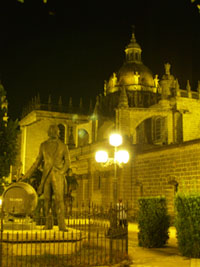 |
Spain | Travel | Regions | Cities | Coasts | Islands | Culture |
| Spain / Andalusia / Costa de la Luz / Cadiz / Jerez de la Frontera |
|
| More Information | ||
| Destinations in Cadiz | ||
| Plan your Trip | ||
| ||||||
 Jerez, located 15 km inland from the beaches of the Costa de la Luz, is internationally known for its wine production, horses, flamenco, fiestas and its important historical and artistic heritage. For motorcycle fans it is well known too due to the annual "Grand Prix".
Jerez, located 15 km inland from the beaches of the Costa de la Luz, is internationally known for its wine production, horses, flamenco, fiestas and its important historical and artistic heritage. For motorcycle fans it is well known too due to the annual "Grand Prix".In fact Jerez is the birthplace of the famous wines DO "Xérès-Jerez-Sherry" and has an ancient wine tradition. For over 3,000 years wine has been produced here, 2000 years ago it began to be exported to Rome. In the twelfth century, these southern Spanish wines were particularly popular in England, and the present name "Sherry" arose from the original Moorish name of the city, "Sherish". The bodegas (wine cellars) of Jerez therefore have a great tradition and are true attractions. Some of them offer guided tours, where you can learn the history and the manufacturing process. At the end there is a tasting of fine wines. Jerez is also the home of famous horses that have been bred here for the first time by the Carthusian monks. Later, this task was taken over by the military. Today we can see this rare and noble breed of horses both at the Horse Fair in May, one of the largest fairs in Andalusia, as well as at a visit to the Palacio Duque de Abrantes, home of the "Royal Andalusian Riding School", where dressage demonstrations are presented.  Furthermore Jerez is one of the "cradles of flamenco" and therefore, both in the tablaos (flamenco clubs) of the city as during the renowned Festival Flamenco Jerez, outstanding performances can be watched. Naturally, there are also numerous monuments in Jerez, we shall now focus on the most important: The town-walls The Alcazar Inside the Alcazar is also the Palacio de Villavicencio, a baroque building from 17th century, which was built on the remains of earlier Moorish buildings and was the residence of the Christian rulers of Jerez. In its main tower, the tallest tower of Jerez, there is the "Cámara oscura", from where you can enjoy a bird's view over Jerez de la Frontera and the surrounding lands thanks to an ingenious combination of lenses and mirrors. The monastery of Cartuja de Santa Maria de la Defensión, Some other churches in Jerez: the Cathedral Among the many palaces, we want to mention these following: Palacio Pemartín |